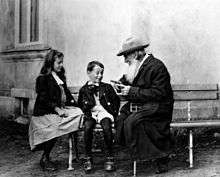Childhood (Tolstoy novel)
Childhood (pre-reform Russian: Дѣтство; post-reform Russian: Детство, tr. Détstvo) is the first published novel by Leo Tolstoy, released under the initials L. N. in the November 1852 issue of the popular Russian literary journal The Contemporary.[1]
 Tolstoy and his grandchildren, c. 1909 | |
| Author | Leo Tolstoy |
|---|---|
| Original title | Дѣтство |
| Translator | Dora O'Brien (2010) |
| Country | Russia |
| Language | Russian |
| Publisher | Sovremennik |
Publication date | 1852 |
| Pages | 358 p. (Paperback) |
| ISBN | 978-1-84749-142-8 |
| Followed by | Boyhood |
It is the first in a series of three novels and is followed by Boyhood and Youth. Published when Tolstoy was just twenty-three years old, the book was an immediate success, earning notice from other Russian novelists including Ivan Turgenev, who heralded the young Tolstoy as a major up-and-coming figure in Russian literature.
Childhood is an exploration of the inner life of a young boy, Nikolenka, and one of the books in Russian writing to explore an expressionistic style, mixing fact, fiction and emotions to render the moods and reactions of the narrator.
Excerpt
"Will the freshness, lightheartedness, the need for love, and strength of faith which you have in childhood ever return? What better time than when the two best virtues -- innocent joy and the boundless desire for love -- were the only motives in life?"[2]
References
- O'Brien, Dora. Trans. Dora O'Brien (2010). "Translator's Note" in Childhood, Boyhood, Youth. London: Penguin Books. p. 358. ISBN 978-1-84749-142-8.
- Original Translation of Вернутся ли когда-нибудь та свежесть, беззаботность, потребность любви и сила веры, которыми обладаешь в детстве? Какое время может быть лучше того, когда две лучшие добродетели — невинная веселость и беспредельная потребность любви — были единственными побуждениями в жизни? from Chapter XV of Детство
External links

- Childhood at Project Gutenberg (transl. by C.J. Hogarth)
- Full text of Childhood in the original Russian
